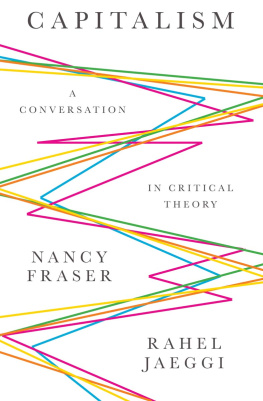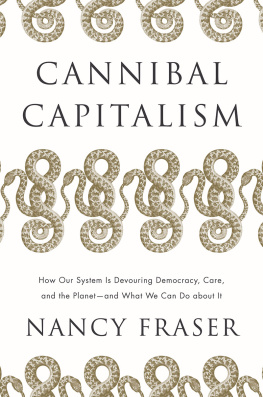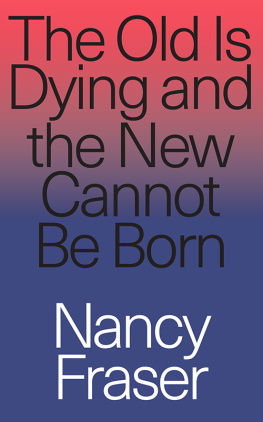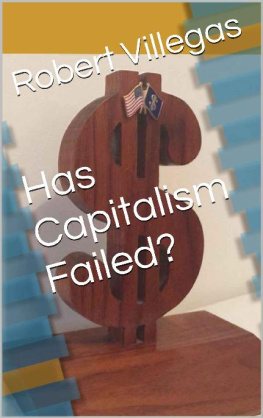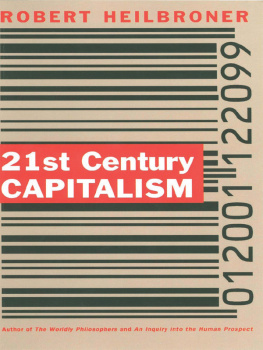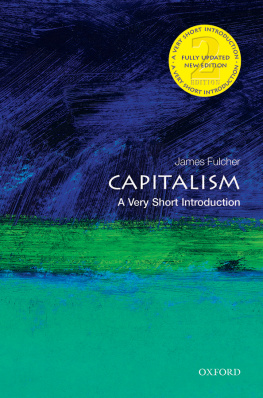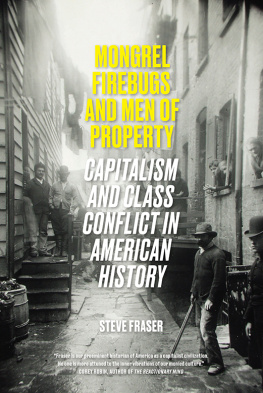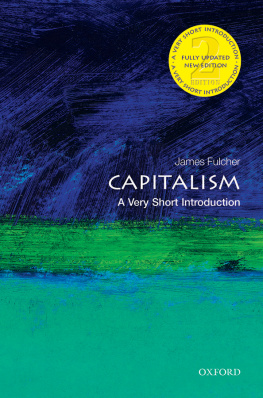Contents
Guide
Pages

Capitalism
A Conversation in Critical Theory
Nancy Fraser and Rahel Jaeggi
Edited by Brian Milstein
polity
Copyright Nancy Fraser and Rahel Jaeggi 2018
The right of Nancy Fraser and Rahel Jaeggi to be identified as Authors of this Work has been asserted in accordance with the UK Copyright, Designs and Patents Act 1988.
First published in 2018 by Polity Press
Polity Press
65 Bridge Street
Cambridge CB2 1UR, UK
Polity Press
101 Station Landing
Suite 300
Medford, MA 02155, USA
All rights reserved. Except for the quotation of short passages for the purpose of criticism and review, no part of this publication may be reproduced, stored in a retrieval system or transmitted, in any form or by any means, electronic, mechanical, photocopying, recording or otherwise, without the prior permission of the publisher.
ISBN-13: 978-1-5095-2526-3
A catalogue record for this book is available from the British Library.
Library of Congress Cataloging-in-Publication Data
Names: Fraser, Nancy, author. | Jaeggi, Rachel, author.
Title: Capitalism : a conversation in critical theory / Nancy Fraser, Rachel Jaeggi.
Description: Medford, MA : Polity, 2018. | Includes bibliographical references and index.
Identifiers: LCCN 2018001732 (print) | LCCN 2018002836 (ebook) | ISBN 9781509525263 (Epub) | ISBN 9780745671567 (hardback) | ISBN 9780745671574 (paperback)
Subjects: LCSH: Capitalism--History. | Critical theory. | BISAC: PHILOSOPHY / History & Surveys / General.
Classification: LCC HB501 (ebook) | LCC HB501 .F694 2018 (print) | DDC 330.12/2--dc23
LC record available at https://lccn.loc.gov/2018001732
The publisher has used its best endeavors to ensure that the URLs for external websites referred to in this book are correct and active at the time of going to press. However, the publisher has no responsibility for the websites and can make no guarantee that a site will remain live or that the content is or will remain appropriate.
Every effort has been made to trace all copyright holders, but if any have been inadvertently overlooked the publisher will be pleased to include any necessary credits in any subsequent reprint or edition.
For further information on Polity, visit our website: politybooks.com
for
Daniel Zaretsky Wiesen
Julian Zaretsky Wiesen
Jakob Jaeggi
Inheritors of the history we have made
Bearers of our hopes for a better future
Preface
We wrote this book in a turbulent time and in an unconventional way. Established certainties were breaking down all around us. Crises of finance and ecology were deepening before our eyes, becoming subjects of overt contestation throughout the world. At the same time, other societal impasses, of family, community, and culture, were churning a bit further below the surface not yet major foci of social struggle, but crises-in-the-making nonetheless, preparing to explode in full view. Finally, the accumulated turmoil appeared to coalesce in a full-scale crisis of political hegemony in 2016, as voters across the globe revolted en masse against neoliberalism, threatening to oust the parties and elites that had sponsored it in favor of populist alternatives, Left and Right. These were what the Chinese (and Eric Hobsbawm) call interesting times.
Interesting especially for philosophers engaged in developing a critical theory of capitalist society. Each of us had been engrossed in that project separately for several years before joining forces to write this book. We made the decision to do so on the assumption that the deepening turbulence around us could be read precisely as a crisis of capitalist society, or, rather, as a crisis of the specific form of capitalist society we inhabit today. The times, it seemed to us, were crying out for this sort of analysis. And what better preparation for the task than our shared background in critical theory and Western Marxism, our history of impassioned political-intellectual engagement with one another, and the capital-critical philosophizing that each of us had been doing individually for quite a while?
We saw our chance when John Thompson proposed that we do a book for Politys Conversations series. But we adapted his proposal to our own purposes. Instead of focusing on the overall trajectory of Nancy Frasers thought, as he initially suggested, we decided to center our conversations specifically on the question of capitalism and on the work that both of us were doing on that theme.
The decision taken, the process of writing this book underwent its own twists and turns. We oscillated back and forth between two conceptions of what we were doing. The idea, at the start, was to record a series of reasonably well-planned conversations on aspects of the topic to converse orally in person and to edit the transcripts in a way that preserved their semi-spontaneous, conversational feel. That conception survives, more or less, in some chapters of the finished book, especially the , by contrast, follows Rahel Jaeggis mapping of the various genres that comprise a critique of capitalism, their respective internal logics and mutual relations. Mostly revised by her, this chapter also presents Jaeggis practice-theoretical view of capitalism as a form of life.
Those individual emphases aside, this book was a joint effort through and through. However unconventional, its format is faithful to the actual creative process we engaged in together in recorded discussions, private conversations, and public presentations in Berlin, Frankfurt, Paris, Cambridge (UK), and New York; in the course of family vacations in Vermont; and in the graduate seminar on Critiques of Capitalism that we co-taught at the New School for Social Research in spring 2016. The book as a whole, we firmly believe, is much greater than the sum of its parts. It emerged from, and reflects, a serendipitous combination of circumstances: that we share many intellectual reference points and political views; that our philosophical approaches nevertheless diverge; and that we enjoy a deep friendship centered on intense if intermittent communication. The result is a book that is richer and deeper than either of us could have produced on her own.
Along the way, we incurred several debts of gratitude, both jointly and individually. Nancy Fraser gratefully acknowledges research support from the Einstein Foundation of the City of Berlin and the JFK Institute for American Studies at the Free University of Berlin; the Rosa Luxemburg Foundation; the Center for Advanced Studies Justitia Amplificata (Frankfurt) and the Forschungskolleg Humanwissenschaften (Bad Homburg); the Centre for Gender Studies and Clare Hall, University of Cambridge; the Research Group on Post-Growth Societies, Friedrich Schiller University (Jena); the Collge dtudes mondiales and the cole des hautes tudes en sciences sociales (Paris); and the New School for Social Research (New York). She is grateful, too, to Cinzia Arruzza and Johanna Oksala for inspiring exchanges on Marxism, feminism and capitalism in the course of team-taught seminars at the New School; to Michael Dawson for pushing her to theorize the place of racial oppression in capitalist society; and to Robin Blackburn, Hartmut Rosa, and Eli Zaretsky for great conversation and probing feedback.
Rahel Jaeggi gratefully acknowledges research support from the German Heuss Professorship scheme, the New School for Social Research, the Research Group on Post-Growth Societies at the Friedrich Schiller University in Jena, Germany, and the Humboldt University-Berlin. She also thanks Eva von Redecker and the other members of her research group (Lea Prix, Isette Schuhmacher, Lukas Kbler, Bastian Ronge, and Selana Tzschiesche) for contributing at various stages and in various ways; Hartmut Rosa, Stefan Lessenich, and Klaus Drre for encouraging discussions and for helping to bring the topic back to the agenda; Axel Honneth and Fred Neuhouser for continuous inspiration; and Martin Saar and Robin Celikates for being those intellectual companions without whom academic life would not be the same.

